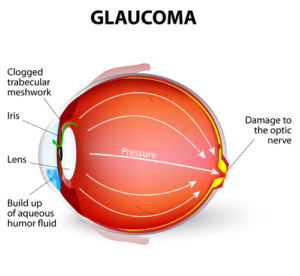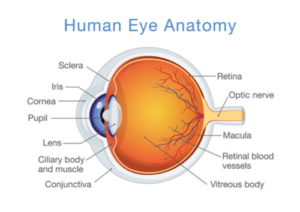10 Things Everyone Should Know About Glaucoma
Glaucoma is a group of eye diseases that destroy your optic nerve. The optic nerve connects your eye to the brain.
It sends visual signals from the retina to the brain, allowing you can see. When glaucoma damages the optic nerve, it disrupts the smooth flow of visual information, causing vision loss.
Without treatment, people with glaucoma slowly lose their peripheral or side vision. Over time, central or straight-ahead vision is also affected.
Eventually, glaucoma leads to permanent blindness. Keep reading to learn the 10 things you should know about glaucoma so you can take the necessary precautions to protect your eyes.
1. Glaucoma is the Second Leading Cause of Blindness in the World

As per the Centers for Disease Control and Prevention, glaucoma is the second leading cause of blindness in the world. Many patients with glaucoma don’t realize they have the eye condition until irreversible vision loss has already occurred, making it essential to schedule regular eye exams with your optometrist or ophthalmologist.
2. There’s No Cure for Glaucoma
There is no cure for glaucoma. It’s a chronic condition that must be monitored and treated for life. Patients may be able to keep the eye condition from progressing with treatment.
3. Glaucoma Usually Doesn’t Have Symptoms

Glaucoma is often called the silent thief of sight. It has this appropriate name because it usually creeps up unnoticed with no symptoms in the early stages.
The CDC reports that half of the people with glaucoma don’t even know they have it. When you notice any symptoms, it’s usually later in the condition once significant damage and vision loss have occurred.
4. Vision Lost Due to Glaucoma is Permanent
Glaucoma is a progressive eye condition that causes irreversible damage. Once it destroys your optic nerve, you cannot restore any vision loss.
5. Anyone Can Develop Glaucoma

Anyone can develop glaucoma. Whether you’re born with glaucoma due to it being congenital or it occurs because of high intraocular pressure levels, people of all ages can have glaucoma. However, some people are more likely to develop glaucoma than others. The risk factors for glaucoma include:
- Being over age 50
- Having a family history of glaucoma
- Undergoing previous eye surgeries
- Having thin corneas
- Previous eye injuries
- Extreme nearsightedness or farsightedness
- People of Hispanic, African American, or Asian descent
- Health conditions like high blood pressure, diabetes, sickle cell anemia, migraines, and heart disease
- Using corticosteroid medications for a long time, especially eye drops
6. Comprehensive Eye Exams Can Result in an Early Glaucoma Diagnosis
The only way to ensure you diagnose glaucoma early and preserve your remaining vision is to have regular eye exams. During a comprehensive eye examination, your ophthalmologist places special drops in your eyes to dilate or widen your pupils.
Widening your pupils allows your eye doctor to examine the back of your eye using a magnifying lens and look for signs of glaucoma. Prompt diagnosis of glaucoma enables your eye doctor to start treatment right away to slow the progression of the disease.
If you’re at a higher risk for glaucoma, it’s essential to have your eyes checked more. Your eye doctor may want you to come in more frequently for eye exams to monitor your eyes for early signs of glaucoma.
7. Increased Intraocular Pressure is a Major Risk Factor for Glaucoma

While the actual cause is unknown, glaucoma is usually linked to abnormally high eye pressure. The pressure, known as intraocular pressure, results from an accumulation of aqueous humor. Aqueous humor is the clear fluid in the eye.
Your eye produces the aqueous humor continuously, which leaves through a drainage system. If the drainage system doesn’t work correctly, the fluid builds up, raising the pressure within your eye.
An increase in intraocular pressure gradually and permanently damages the optic nerve, causing vision loss. It’s important to note that not everyone with elevated eye pressure gets glaucoma. Also, some people with normal eye pressure still develop glaucoma. However, many patients with glaucoma have elevated intraocular pressure levels.
8. It’s Possible to Slow Down the Progression of Glaucoma
Glaucoma has no cure, and without treatment, it will cause permanent vision loss. However, getting a glaucoma diagnosis doesn’t mean patients will go blind.
Prompt diagnosis and timely treatment are critical. They can help slow down the progression of the eye condition and save your remaining sight.
An early diagnosis is the best defense against glaucoma, making comprehensive eye exams extremely important. If you find out you have glaucoma, prompt treatment will help ensure the management of the eye condition and prevent additional vision loss.
9. There are Numerous Glaucoma Treatment Options
Eye drops are usually the first line of glaucoma treatment. Other treatment options include:
- Oral medications
- Laser surgery
- Traditional surgery methods
- Minimally invasive glaucoma surgeries (MIGS)
- A combination of some of these methods
Treatment varies from patient to patient. Your eye doctor will discuss the best approach for you, depending on the severity of your symptoms and the kind of glaucoma you have.
Glaucoma treatment can prevent vision loss. But it can’t bring back vision already lost to glaucoma, so early diagnosis is crucial.
10. Glaucoma Treatments Work by Lowering Your Eye Pressure

The goal of glaucoma treatment is to reduce your intraocular pressure. Some medications achieve this by increasing fluid drainage from your eye, while others help your eye produce less fluid.
Protect Your Sight from Glaucoma
If you’re at high risk for glaucoma, seeing the experienced team of eye doctors at Eye Consultants of North Dakota as soon as possible is critical. Regular eye examinations will ensure you enjoy a lifetime of the best vision possible.
Are you ready to protect your vision against glaucoma? Schedule your appointment at Eye Consultants of North Dakota in Fargo, ND, today!



